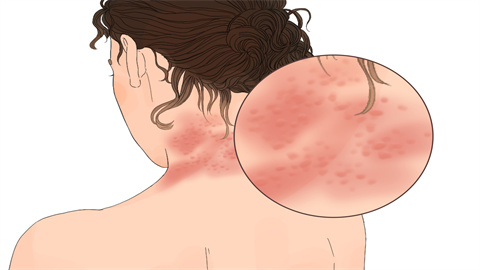What should be done for a drug allergy rash?
Generally, rashes caused by drug allergies can be managed by immediately stopping the medication, avoiding other allergens, applying local cold compresses, using topical medications, and taking oral medications. In urgent situations, it is recommended to seek medical attention promptly. A detailed explanation is as follows:

1. Discontinue the medication immediately
If a rash is confirmed to be caused by medication, it is important to promptly stop taking the drug under a doctor's guidance, and avoid re-exposure to prevent worsening of the allergic reaction. If it is unclear which drug caused the allergy, allergen testing can be performed first.
2. Avoid other allergens
Once an allergic reaction has occurred, in addition to discontinuing the medication, it is also necessary to avoid other allergens such as pollen and dust mites. In terms of diet, try to avoid consuming milk, milk powder, and similar products to prevent exacerbation of symptoms and interference with recovery.
3. Local cold compress
A cold compress with a cold towel may be applied locally. If symptoms such as redness, swelling, and warmth are severe, an ice pack may be used for cold compress therapy. Cold compresses help alleviate allergic reactions by constricting capillaries. It is generally recommended to apply cold compresses for 5–10 minutes per session, 3–4 times daily.
4. Topical medications
If the skin feels significantly itchy, it is recommended to use appropriate topical medications under a doctor's guidance to relieve symptoms, such as calamine lotion, mometasone furoate cream, or hydrocortisone butyrate cream, which can help relieve itching and reduce swelling.
5. Oral medications
When symptoms are severe and topical medications are not effective, oral medications may be used in combination under medical supervision, such as loratadine tablets, cetirizine hydrochloride capsules, or ebastine tablets, to reduce allergic reactions and promote skin recovery.
It should be noted that the above methods should be selected according to individual conditions to alleviate discomfort. Personal hygiene should also be maintained during treatment to prevent cross-infection.









